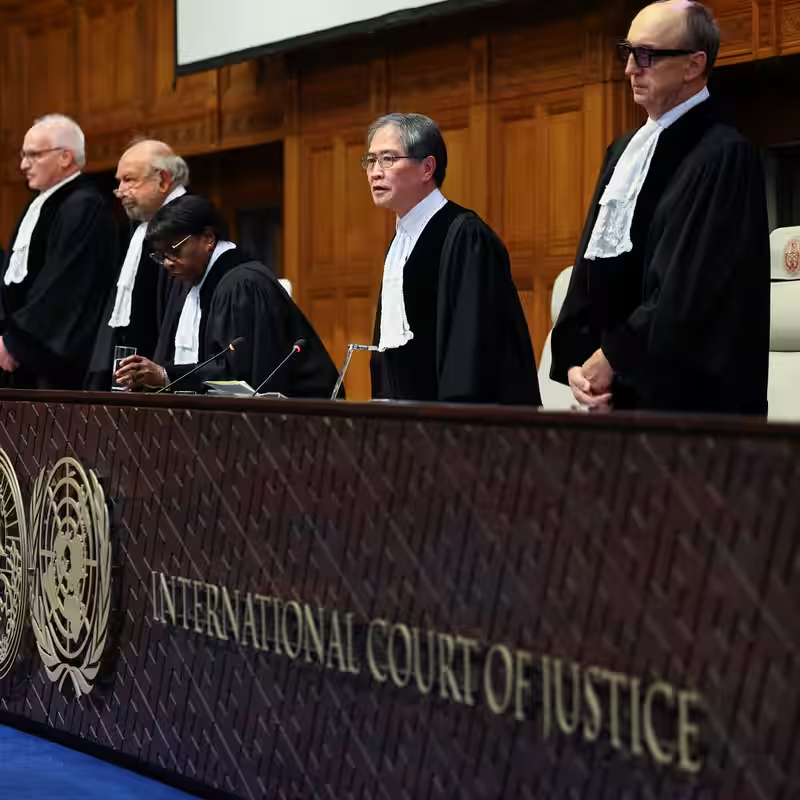Table of Contents
- ICJ Ruling on Gaza Aid
- Why the Ruling Matters
- Israel’s Stance on UNRWA
- Symbolic Yet Significant
- Current Aid Situation in Gaza
- International Reactions
- Sources
ICJ Ruling on Gaza Aid
In a landmark advisory opinion issued Wednesday, the International Court of Justice (ICJ) directed Israel to stop obstructing humanitarian aid efforts in Gaza and the West Bank. The court emphasized that Israel, as the occupying power, must ensure civilians receive “essential supplies of daily life”—including food, water, shelter, and medical care.
The ruling came in response to a request from the United Nations General Assembly and specifically addressed Israel’s repeated interference with U.N. relief operations, particularly those led by UNRWA—the U.N. agency for Palestinian refugees.
Why the Ruling Matters
While ICJ advisory opinions are not legally binding, they carry immense moral and diplomatic weight. The court’s president, Judge Yuji Iwasawa, stated clearly that Israel should “facilitate, not hinder,” the work of international aid organizations operating in Palestinian territories.
This marks one of the strongest international rebukes of Israel’s handling of humanitarian access during the ongoing conflict. Aid groups have long reported delays, inspections, and outright blockades at Israeli checkpoints that severely limit the flow of life-saving supplies into Gaza.
Israel’s Stance on UNRWA
Israel has accused UNRWA of being infiltrated by Hamas, citing alleged ties between some staff members and the militant group. In recent months, Israeli officials have pushed to dismantle or defund the agency entirely—a move that has drawn sharp criticism from humanitarian organizations and Western allies.
The ICJ explicitly rejected this justification, affirming UNRWA’s critical role and urging Israel to cooperate with its operations. “The work of UNRWA must not be impeded,” the court declared, noting that millions of Palestinians rely on the agency for basic services.
Symbolic Yet Significant
Legal experts stress that while the ICJ cannot enforce its opinion, the ruling strengthens the legal and political case against Israel in international forums. It may influence future actions by the International Criminal Court (ICC), U.N. Security Council resolutions, or aid-conditionality decisions by donor countries.
“Advisory opinions like this shape global norms,” said Dr. Leila Farah, a professor of international law at Georgetown University. “They signal to the world what is—and isn’t—acceptable under international humanitarian law.”
Current Aid Situation in Gaza
A fragile U.S.-brokered ceasefire, backed by the Trump administration, has allowed a modest increase in aid deliveries to Gaza. However, humanitarian groups say it’s far from sufficient. The World Food Programme reports that over 1.7 million people in Gaza face acute food insecurity, while hospitals operate without reliable electricity or medical supplies.
“Trucks are getting through, but it’s a trickle, not a flood,” said Médecins Sans Frontières spokesperson Amina Khalid. “People are still dying from preventable causes—malnutrition, infection, lack of insulin.”
International Reactions
The European Union welcomed the ICJ opinion, calling it “a necessary reminder of Israel’s obligations under international law.” Meanwhile, the Biden administration, while supportive of increased aid, stopped short of endorsing the court’s findings, citing ongoing diplomatic efforts.
Palestinian leaders hailed the decision as a “victory for justice,” while Israeli officials dismissed it as “politically motivated” and reiterated their security concerns.




